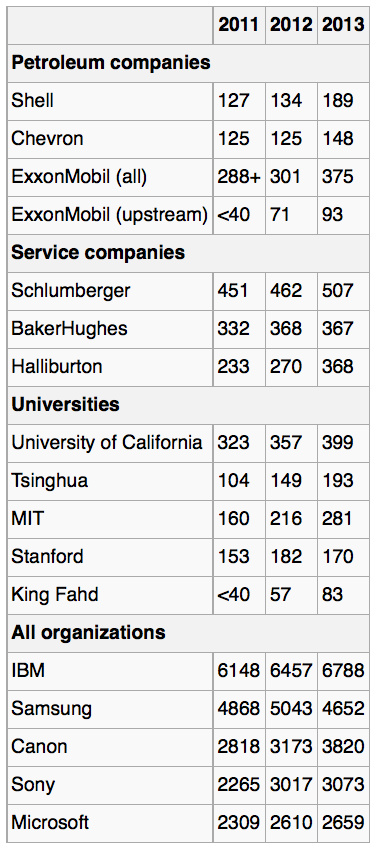Patents are slowing us down
/ I visited a geoscience consulting company in Houston recently. Various patent awards were proudly commemorated on the walls on little plaques. It's understandable: patents are difficult and expensive to get, and can be valuable to own. But recently I've started to think that patents are one of the big reasons why innovation in our industry happens at a snail's pace, in the words of Paul de Groot in our little book about geophysics.
I visited a geoscience consulting company in Houston recently. Various patent awards were proudly commemorated on the walls on little plaques. It's understandable: patents are difficult and expensive to get, and can be valuable to own. But recently I've started to think that patents are one of the big reasons why innovation in our industry happens at a snail's pace, in the words of Paul de Groot in our little book about geophysics.
Have you ever read a patent? Go and have a read of US Patent 8670288, by Børre Bjerkholt of Schlumberger. I'll wait here.
What are they for?
It is more or less totally unreadable. And Google's rendering, even the garbled math, is much nicer than the USPTO's horror show. Either way, I think it's safe to assume that almost no-one will ever read it. Apart from anything else, it's written in lawyerspeak, and who wants to read that stuff?
Clearly patents aren't there to inform. So why are they there?
- To defend against claims of infringement by others? This seems to be one of the main reasons technology companies are doing it.
- To intimidate others into not trying to innovate or commercialize an innovation? With the possible unintended consequence of forcing competitors to avoid trouble by being more inventive.
- To say to Wall Street (or whoever), "we mean business"? Patents are valuable: the median per-patent price paid in corporate acquisitions in 2012 was $221k.
- To formalize the relationship between the inventor (a human, given that only humans have the requisite inventive genius) and the intellectual property owner (usually a corporation, given that it costs about $40k in lawyer's fees to apply for a patent successfully)?
- Because all the cool kids are doing it? Take a look at that table. You don't want to get left behind do you?
I'm pretty sure most patents in our industry are a waste of money, and an unecessary impediment to innovation in our industry. If this is true then, as you see from the trend in the data, we have something to worry about.
A dangerous euphemism
That phrase, intellectual property, what exactly does that mean? I like what Cory Doctorow — one of Canada's greatest intellects — had to say about intellectual property in 2008:
the phrase "intellectual property" is, at root, a dangerous euphemism that leads us to all sorts of faulty reasoning about knowledge.
He goes on to discuss that intellectual property is another way of saying 'ideas and knowledge', but can those things really be 'property'? They certainly aren't like things that definitely are property: if I steal your Vibroseis truck, you can't use it any more. If I take your knowledge, you still have it... and so do I. If it was useful knowlege, then now it's twice as useful.
This goes some way to explaining why 2 weeks ago, the electric car manufacturer Telsa relinquished its right to sue patent infringers. The irrepressible Elon Musk explained::
Yesterday [11 June], there was a wall of Tesla patents in the lobby of our Palo Alto headquarters. That is no longer the case. They have been removed, in the spirit of the open source movement, for the advancement of electric vehicle technology.
This is bold, but smart — Tesla knows that its best chance of dominating a large electric vehicle industry depends on there being a large electric vehicle industry. And they've just made that about 10 times more likely.
What will we choose?
I think one of the greatest questions facing our industry, and our profession, is: How can we give ourselves the best chance of maintaining the ability to find and extract petroleum in a smart, safe, ethical way, for as long as humanity needs it? By seeking to stop others from applying a slightly new velocity model building algorithm? By locking up over 2000 other possibly game-changing ideas a year? Will society thank us for that?
Havard Business Review also published a piece yesterday on patents — Patents Are Eating the World and Hurting Innovation, by Walter Frick. He points out that, thanks to the amount of patent litigation, patents actually reduce the profitability of innovation in most industries.
I assume it's just 'most industries', because the legal industry is doing pretty well out of it.
My latest: Patents Are Eating the World and Hurting Innovation http://t.co/qmwIExYKqG pic.twitter.com/3uT4I3RXC1
— Walt Frick (@wfrick) June 26, 2014








 Except where noted, this content is licensed
Except where noted, this content is licensed